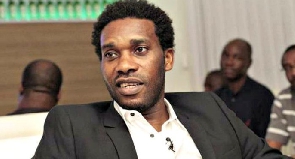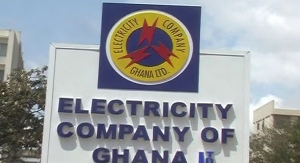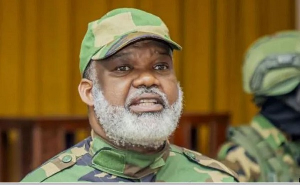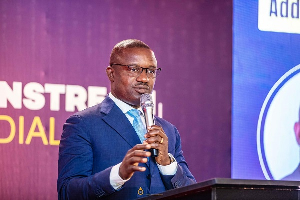It was my greatest pleasure and honor to visit Ghana for a few days, after nearly two decades. I was impressed with the hard working people of Ghana, especially the youth. Almost everyone that I met was trying to sell something as means of making a living. However, I was saddened at the fact that the time and energy of the youth is rather being channeled in the wrong direction. I asked myself this, “If all these young boys and girls have to work that hard on the streets of Ghana to make ends meet, what time is left for them to study or do their home work from school?” Somehow I think these future assets of Ghana are gradually wasting away due to the lack of opportunities, direction and leadership. If the leadership will permit this mismanagement of the nation’s assets then what does the future hold for Ghana?
I am very thankful for the strength and energy of the people of Ghana. It is a miracle that they are able to survive despite the odds against them, including the squalor that surrounds many neighborhoods. To my surprise, I saw about 99% of the gutters wide open and choked. Many of them are breeding mosquitoes. I wondered why all the noise about malaria prevention and eradication when we are knowingly breeding mosquitoes and producing twice as many malaria cases as are cured? Can’t the communities take it upon themselves to stop this? Where are the chiefs and community leaders? Ghanaians need a shepherd! Is this lack of leadership or sheer ignorance? Why would gutters in this modern age be opened and not covered?
THE MEDIA
There are so many FM stations and TV stations, which is a good thing but they are hardly productive. You will be shocked about the kind of “pollution” that goes on in the airwaves. Over 90% of the time is spent on gossips-and “self-proclaimed preachers.” It sounded like the people are so desperate that they have been left at the mercy of false prophets and teachers who are feeding fat off the poor. In listening to the news, I could feel and sense some vacuum of leadership/direction; it was like “a flock of sheep desperate for a shepherd.” There is lack of direction and focus and the media is contributing to it. Most of our people are living in “a survival mode;” desperate and looking for help and guidance.
Before I arrived in Ghana in May 2010, I had high-expectations. With all the hype about road infrastructure and development, I was expecting a change in style, at least, covered gutters and proper drainage along the roads to meet international standards. I must admit that there were a few good ones but the sad news is that there appears to be no plan for future developments. Substandard roads are still being constructed. The overhead bridges and a few others are impressive but shockingly, they still display alongside open gutters. Some gutters are so big that they pose a threat to humans and even cars. I see them as death traps. Are the open gutters part of the road engineering in Ghana? How can’t we cover or simply use rubber/plastic tubes as conduit for running water along our roads? It should even cost us less both in time and money. For instance, as I travelled on Spintex Road, I nearly went crazy. I thought this was a major road work that needed a big Company with modern tools. I was not expecting to see a contractor to be using pick axes and shovels to dig ditches for gutters along such a major road. But this was what I saw; not once but in several places: CONTRACTORS USE MANUAL LABOR TECHNIQUES FOR ROAD CONSTRUCTION. They still work with pick axes and shovels for major road construction, I am sorry to report. It is therefore not surprising that it does not only take years on a simple project but new projects even create worse and bigger problems. How can we maintain our roads when contractors refuse to invest in simple machines after being awarded billions of Ghana cedis worth of contract? I was wondering if they went through “Tender and bidding?” Did they bribe some officials to get the contracts? Are they Party members?
I saw many big and impressive mansions. I was quick to take photos to show to my friends abroad who think that Africans and for that matter, Ghanaians live in huts. To tell you the truth these mansions in Ghana are comparable if not superior to some of the houses in the Diaspora. One of the problems is that there is little planning and organization in where they are built. There is also basically no infrastructure- irregular supply of electricity, no running water and no roads leading to these mansions. The existing roads are so bad that you have to take your car to the Shop for repairs every month if not sooner. I was shocked to see the rocky, muddy, neglected roads. Some of the roads had heaps of soil meant for the road repairs abandoned for months and only creating traffic jams. In many instances there are no roads at all. I hear there is a plan but it has not been implemented. So where is leadership when everybody is doing his or her own thing?
DEATH TRAPS
The nature of the roads in Ghana needs a serious review. Even along the Tema Motor Way one can find illegal exits. Who authorized these paths and exits? There are too much confusion on the roads and no Police presence. Apart from the fact that there is too much traffic congestion, I saw no enforcement of traffic regulations. A taxi driver, for example could face you head on if that is how he can skip traffic. Broken down vehicles were left in the middle of the roads creating unnecessary traffic jams. A passenger can get down from a vehicle in traffic and act like traffic warden or an Officer to clear the road (of traffic) in front of him and hop back into the car and the driver will take off. The traffic lights are out in many places and where they are working, many drivers do not take notice. To my biggest surprise, I did not see “stop signs” at many intersections.
INFRASTRUCTURE
Basic infrastructure like water is a problem in Ghana. I was at Tema, Accra, and Kumasi and almost every house had no running water all the time. Individuals had to buy their own water tanks and wait at the mercy of the rain or buy water from somewhere. As for the electricity, I was not surprised. I knew there were frequent power cuts in the past but again not in the frequency that I observed this time. Light could go off intermittently within a span of an hour, destroying people’s appliances.
OTHERS
One could go on endlessly listing problems but that is not the point of this author. The point is: When are we going to take responsibility to solve our problems? “When are we going to have a shepherd to lead us to green pastures?” Ghana as of now is like a sheep in want and wandering in the Wilderness. Fortunately many of these are simple problems that need simple solutions like:
1. Enforcement of the existing laws
2. Putting road signs up, especially “Stop signs.”
3. Making disciplined Police visible to meaningfully enforce traffic regulations.
4. Instituting instant fines and punishment for traffic offences.
5. Implementing pragmatic solutions besides just praying.
6. Empowering communities to take care of their surroundings. We can begin by:
i. Mandating and encouraging Home Owners Associations
ii. Assisting communities to raise funds for their neighborhood maintenance and cleaning. Government may mandate setting up proper accounting with the Banks from Home Owner dues.
iii. Allow cities (DCE’s or Mayors) to be responsible for their basic infrastructure iv. Central Government (Castle) should only be concerned with major national budgets for highways not neighborhood driveways.
v. Set standards, award contracts to qualified individuals and monitor them with mandates.
vi. Government policies must be geared towards encouraging Ghanaians at home and those in the Diaspora who are willing to offer their expertise and help. Stop frustrating genuine and honest people who want to help.
Copyright ©Okyere Bonna, MBA [www.okyerebonna.com] The author is the author of many books including: Ghana, the Rediscovered Soccer Might (SPORTS)’ Stopping the Carnage on Africa Roads, A New Agenda for Ghana (Vol. I &I II), Ghana, Conversation and Development, Traditional Institutions and Public Administration in Democratic Africa (http://www.africaninstitutions.com/)
Opinions of Thursday, 17 June 2010
Columnist: Bonna, Okyere






![The suspect, Daniel Tuffuor [L] and deceased Yobani Deladem Aku The suspect, Daniel Tuffuor [L] and deceased Yobani Deladem Aku](https://cdn.ghanaweb.com/imagelib/pics/404/40485450.295.jpg)











